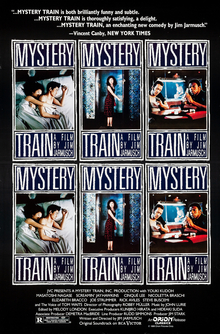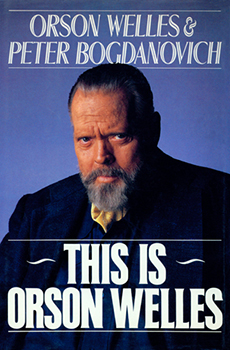
Citizen Kane is a 1941 American drama film directed by, produced by, and starring Orson Welles. Welles and Herman J. Mankiewicz wrote the screenplay. The picture was Welles' first feature film. Citizen Kane is frequently cited as the greatest film ever made. For 40 years, it stood at number 1 in the British Film Institute's Sight & Sound decennial poll of critics, and it topped the American Film Institute's 100 Years ... 100 Movies list in 1998, as well as its 2007 update. The film was nominated for Academy Awards in nine categories and it won for Best Writing by Mankiewicz and Welles. Citizen Kane is praised for Gregg Toland's cinematography, Robert Wise's editing, Bernard Herrmann's music, and its narrative structure, all of which have been considered innovative and precedent-setting.

Touch of Evil is a 1958 American film noir written and directed by Orson Welles, who also stars in the film. The screenplay was loosely based on the contemporary Whit Masterson novel Badge of Evil (1956). The cast included Charlton Heston, Janet Leigh, Joseph Calleia, Akim Tamiroff and Marlene Dietrich.

The Third Man is a 1949 film noir directed by Carol Reed, written by Graham Greene, and starring Joseph Cotten, Alida Valli, Orson Welles and Trevor Howard, set in post-war Vienna. The film centres on American Holly Martins (Cotten) who arrives in the city to accept a job with his friend Harry Lime (Welles), only to learn that Lime has died. Martins decides to stay in Vienna and investigate the suspicious death.

Dead Man is a 1995 American acid western film written and directed by Jim Jarmusch. It stars Johnny Depp, Gary Farmer, Billy Bob Thornton, Iggy Pop, Crispin Glover, John Hurt, Michael Wincott, Lance Henriksen, Gabriel Byrne, Mili Avital, and Robert Mitchum in his final film performance. The movie, set in the late 1800s, follows William Blake, a meek accountant on the run after murdering a man. He has a chance encounter with enigmatic Native American spirit-guide "Nobody", who believes Blake is the reincarnation of the visionary English poet William Blake.

Stranger Than Paradise is a 1984 American black-and-white absurdist deadpan comedy film directed, co-written and co-edited by Jim Jarmusch, and starring jazz musician John Lurie, former Sonic Youth drummer-turned-actor Richard Edson, and Hungarian-born actress and violinist Eszter Balint. It features a minimalist plot in which the main character, Willie, is visited by Eva, his cousin from Hungary. Eva stays with him for ten days before going to Cleveland. Willie and his friend Eddie go to Cleveland to visit her, and the three then take a trip to Florida. The film is shot entirely in single long takes with no standard coverage.

Macbeth is a 1948 American historical drama directed by Orson Welles. A film adaptation of William Shakespeare's tragedy of the same name, it tells the story of the Scottish general who becomes the King of Scotland through treachery and murder. The film stars Welles in the lead role and Jeanette Nolan as Lady Macbeth.
Emanuel Farber was an American painter, film critic and writer. Often described as "iconoclastic", Farber developed a distinctive prose style and set of theoretical stances which have had a large influence on later generations of film critics and influence on underground culture. Susan Sontag considered him to be "the liveliest, smartest, most original film critic this country has ever produced."
Raymond Durgnat was a British film critic, who was born in London to Swiss parents. During his life he wrote for virtually every major English language film publication. In 1965 he published the first major critical essay on Michael Powell, who had hitherto been "fashionably dismissed by critics as a 'technician's director'", as Durgnat put it.

Mystery Train is a 1989 comedy-drama anthology film written and directed by Jim Jarmusch and set in Memphis, Tennessee. The film is a triptych of stories involving foreign protagonists, unfolding over the course of the same night. "Far from Yokohama" features a Japanese couple on a cultural pilgrimage, "A Ghost" focuses on an Italian widow stranded in the city overnight, and "Lost in Space" follows the misadventures of a newly single and unemployed Englishman and his reluctant companions. The narratives are linked by a run-down flophouse overseen by a night clerk and his disheveled bellboy, the use of Elvis Presley's song "Blue Moon", and a gunshot.

The Magnificent Ambersons is a 1942 American period drama written, produced, and directed by Orson Welles. Welles adapted Booth Tarkington's Pulitzer Prize–winning 1918 novel about the declining fortunes of a wealthy Midwestern family and the social changes brought by the automobile age. The film stars Joseph Cotten, Dolores Costello, Anne Baxter, Tim Holt, Agnes Moorehead and Ray Collins, with Welles providing the narration.

James Lewis Hoberman is an American film critic, journalist, author and academic. He began working at The Village Voice in the 1970s, became a full-time staff writer in 1983, and was the newspaper's senior film critic from 1988 to 2012. In 1981, he coined the term "vulgar modernism" to describe the "looney" fringes of American popular culture.
Sara Miller Driver is an American independent filmmaker and actress from Westfield, New Jersey. A participant in the independent film scene that flourished in lower Manhattan from the late 1970s through the 1990s, she gained initial recognition as producer of two early films by Jim Jarmusch, Permanent Vacation (1980) and Stranger Than Paradise (1984). Driver has directed two feature films, Sleepwalk (1986) and When Pigs Fly (1993), as well as a notable short film, You Are Not I (1981), and a documentary, Boom for Real: The Late Teenage Years of Jean-Michel Basquiat (2017), on the young artist's pre-fame life in the burgeoning downtown New York arts scene before the city's massive changes through the 1980s. She served on the juries of various film festivals throughout the 2000s.

The Battle Over Citizen Kane is a 1996 American documentary film directed and produced by Thomas Lennon and Michael Epstein, from a screenplay by Lennon and Richard Ben Cramer, who also narrates. It chronicles the clash between Orson Welles and William Randolph Hearst over the production and release of Welles's 1941 film Citizen Kane, which has been considered the greatest film ever made.

Acid Western is a subgenre of the Western film that emerged in the 1960s and 1970s that combines the metaphorical ambitions of critically acclaimed Westerns, such as Shane and The Searchers, with the excesses of the Spaghetti Westerns and the outlook of the counterculture of the 1960s, as well as the increase in illicit drug taking of, for example, cannabis and LSD. Acid Westerns subvert many of the conventions of earlier Westerns to "conjure up a crazed version of autodestructive white America at its most solipsistic, hankering after its own lost origins".

Orson Welles (1915–1985) was an American director, actor, writer, and producer who is best remembered for his innovative work in radio, theatre and film. He is widely considered one of the greatest and most influential filmmakers of all time.

This is Orson Welles is a 1992 book by Orson Welles and Peter Bogdanovich that comprises conversations between the two filmmakers recorded over several years, beginning in 1969. The wide-ranging volume encompasses Welles's life and his own stage, radio, and film work as well as his insights on the work of others. The book was edited after Welles's death, at the request of Welles's longtime companion and professional collaborator, Oja Kodar. Jonathan Rosenbaum drew from several incomplete drafts of the manuscript and many reel-to-reel tapes, most of which had already been transcribed. Much of the dialogue, however, had been rewritten by Welles, often in several drafts.

Bigger Than Life is a 1956 American drama film directed by Nicholas Ray and starring James Mason, Barbara Rush, and Walter Matthau. Its plot follows an ailing school teacher and family man whose life spins out of control when he misuses cortisone. It is based on a 1955 article by medical writer Berton Roueché in The New Yorker, titled "Ten Feet Tall". In addition to starring in the film, Mason produced it.
This is a bibliography of books by or about the director and actor Orson Welles.

"Raising Kane" is a 1971 book-length essay by American film critic Pauline Kael, in which she revived controversy over the authorship of the screenplay for the 1941 film Citizen Kane. Kael celebrated screenwriter Herman J. Mankiewicz, first-credited co-author of the screenplay, and questioned the contributions of Orson Welles, who co-wrote, produced and directed the film, and performed the lead role. The 50,000-word essay was written for The Citizen Kane Book (1971), as an extended introduction to the shooting script by Mankiewicz and Welles. It first appeared in February 1971 in two consecutive issues of The New Yorker magazine. In the ensuing controversy, Welles was defended by colleagues, critics, biographers and scholars, but his reputation was damaged by its charges. The essay and Kael's assertions were later questioned after Welles's contributions to the screenplay were documented.

It's All True: Based on an Unfinished Film by Orson Welles is a 1993 documentary film about Orson Welles's ill-fated Pan-American anthology film It's All True, shot in 1941–42 but never completed. Written and directed by Richard Wilson, Bill Krohn and Myron Meisel, the film is narrated by Miguel Ferrer. It was named the year's Best Non-Fiction Film by the Los Angeles Film Critics Association, and its filmmakers received a special citation from the National Society of Film Critics.
















